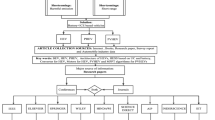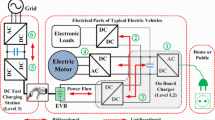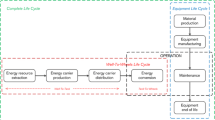Abstract
Since fuel consumption of parallel Plug-in hybrid electric vehicles (PHEVs) is significantly different in various driving cycles, an adaptive optimal control strategy based on route information is proposed. First, the energy management strategy structure of adaptive Pontryagin’s Minimum Principle (APMP) is established. Second, genetic algorithm is employed to obtain a Map, which is co-state function of driving distances and state of charge (SOC) and makes this strategy used online. Furthermore, co-state value is updated in real time according to route information and reference SOC, which improves the adaptability of APMP control strategy. Finally, MATLAB/Simulink and AVL/Cruise software are employed as simulation tools to verify the proposed APMP control strategy. The performance of APMP control strategy is compared to rule-based (RB) control strategy. Results show that the proposed APMP control strategy could greatly improve the fuel economy of the parallel PHEV for different driving conditions.
Similar content being viewed by others
Abbreviations
- f :
-
state variable function
- G :
-
genetic function
- H :
-
hamilton function
- J :
-
fuel consumption, kg
- ṁ f :
-
instantaneous fuel consumption rate, kg/s
- n :
-
rotation speed, rpm
- S :
-
distance, km
- SOC :
-
state of charge
- t :
-
time, s
- T :
-
torque, Nm
- u :
-
control variable
- V :
-
vehicle speed, m/s
- x :
-
state variable
- λλ:
-
co-state variable, kg
- f :
-
state variable function
- ave:
-
average
- ini:
-
initial
- ter:
-
terminal
References
Cordiner, S., Galeotti, M., Mulone, V., Nobile, M. and Rocco, V. (2015). Trip-based SOC management for a plugin hybrid electric vehicle. Applied Energy, 164, 891–905.
Deng, T., Lu, R, Li, Y. N. and Lin, C. S. (2016). Adaptive energy control strategy of HEV based on driving cycle recognition by LVQ algorithm. China Mechanical Engineering 27, 3, 420–425.
Feng, T. H., Yang, L., Gu, Q., Hu, Y. Q., Yan, T. and Yan, B. (2015). A supervisory control strategy for plug-in hybrid electric vehicles based on energy demand prediction and route preview. IEEE Trans. Vehicular Technology 64, 5, 1691–1700.
Geng, B., Mills, J. K. and Sun, D. (2014). Combined power management/design optimization for a fuel cell/battery plug-in hybrid electric vehicle using multi-objective particle swarm optimization. Int. J. Automotive Technology 15, 4, 645–654.
Guo, J. H., Liu, C. and Chu, L. (2016). Research on route-based fuzzy adaptive control strategy of PHEV. Proc: Int. Conf Advanced Manufacturing and Industrial Application. Phuket, Thailand.
Hou, C., Ouyang, M. G., Xu, L. F. and Wang, H. W. (2014). Approximate Pontryagin’s minimum principle applied to the energy management of plug-in hybrid electric vehicles. Applied Energy, 115, 174–189.
Hu, X., Zou, Y. and Yang, Y. (2016). Greener plug-in hybrid electric vehicles incorporating renewable energy and rapid system optimization. Energy, 111, 971–980.
Jeong, J., Choi, J., Lee, D., Cha, S. W., Kim, N. and Park, Y. I. (2014). Development of PMP based power management strategy for a series hybrid electric bus. Proc: Vehicle Power and Propulsion Conf., Coimbra, Portugal.
Liu, H., Li, X. M., Wang, W. D., Han, L. J. and Xiang, C. L. (2018). Markov velocity predictor and radial basis function neural network based real-time energy management strategy for plug-in hybrid electric vehicles. Energy, 152, 427–444.
Malikopoulos, A. (2014). A supervisory power management control algorithm for hybrid electric vehicles: a survey. IEEE Trans. Intelligent Transportation Systems 15, 5, 1869–1885.
Manzie, C., Kim, T. S. and Sharma, R. (2012). Optimal use of telemetry by parallel hybrid vehicles in urban driving. Transportation Research Part C-Emerging Technologies, 25, 134–151.
Nicolas, D., Maxime R. D. and Alain, D. (2015). Fuzzy-based blended control for the energy management of a parallel plug-in hybrid electric vehicle. Intelligent Transport Systems 9, 1, 30–37.
Onori, S., Serrao, L. and Rizzoni, G. (2010). Adaptive equivalent consumption minimization strategy for hybrid electric vehicles. Proc: ASME Dynamic Systems and Control Conf., Cambridge, Massachusetts, USA.
Onori, S. and Tribioli, L. (2015). Adaptive Pontryagin’s Minimum Principle supervisory controller design for the plug-in hybrid GM Chevrolet Volt. Applied Energy, 147, 224–234.
Patil, R. M., Filipi, Z. and Fathy, H. K. (2014). Comparison of supervisory control strategies for series plug-in hybrid electric vehicle powertrains through dynamic programming. IEEE Trans. Control Systems Technology 22, 2, 502–509.
Tian, H., Wang, X., Lu, Z. W., Huang, Y. and Tian, G. Y. (2018). Adaptive fuzzy logic energy management strategy based on reasonable soc reference curve for online control of plug-in hybrid electric city bus. IEEE Trans. Intelligent Transportation Systems 19, 5, 1607–1617.
Vajedi, M., Taghavipour, A., Azad, N. L. and McPhee, J. (2014). A comparative analysis of route-based power management strategies for real-time application in plug-in hybrid electric vehicles. Proc. American Control Conf., Portland, Oregon, USA.
Wang, X. M., He, H. W., Sun, F. C. and Zhang, J. L. (2015). Application study on the dynamic programming algorithm for energy management of plug-in hybrid electric vehicles. Energies 8, 4, 3225–3244.
Wang, Y. Q., Wu, Z., Chen, Y. Y., Xia, A. Y., Guo, C. and Tang, Z. Y. (2018). Research on energy optimization control strategy of the hybrid electric vehicle based on Pontryagin’s minimum principle. Computers & Electrical Engineering, 72, 203–213.
Zeng, Y. P., Cai, Y, Kou, G. Y, Gao, W. and Qin, D. T. (2018). Energy management for plug-in hybrid electric vehicle based on adaptive simplified-ECMS. Sustainability 10, 6, 2060–2083.
Zhang, C., Vahidi, A., Pisu, P., Li, X. P. and Tennant, K. (2010). Role of terrain preview in energy management of hybrid electric vehicles. IEEE Trans. Vehicular Technology 59, 3, 1139–1147.
Zhang, F., Liu, H., Hu, Y. and Xi, J. (2016). A supervisory control algorithm of hybrid electric vehicle based on adaptive equivalent consumption minimization strategy with fuzzy PI. Energies 9, 11, 919–944.
Zhang, J. Y, Wu, Y. H., Shen, T. L. and Fan, J. X. (2017a). Logical stochastic optimization approach to energy management of plug-in hybrid electric vehicle. Proc: Chinese Control Conf., Dalian, China.
Zhang, Y, Chu, L., Fu, Z.C., Xu, N., Guo, C., Zhang, X. Z., Chen, Z. H. and Wang, P. (2017b). Optimal energy management strategy for parallel plug-in hybrid electric vehicle based on driving behavior analysis and real time traffic information prediction. Mechatronics, 46, 177–192.
Acknowledgement
The author(s) disclosed receipt of the following financial support for the research, authorship, and/or publication of this article: This work was supported by National Key R&D Program of China (grant no. 2018YFB0106200) and the Jilin Province Key Scientific and Technological Research Projects of China (grant no. 20170204085GX) and the National Natural Science Foundation of China (grant no. 51775229).
Author information
Authors and Affiliations
Corresponding author
Additional information
Publisher’s Note
Springer Nature remains neutral with regard to jurisdictional claims in published maps and institutional affiliations.
Rights and permissions
About this article
Cite this article
Liu, K., Guo, J., Chu, L. et al. Research on Adaptive Optimal Control Strategy of Parallel Plug-In Hybrid Electric Vehicle Based on Route Information. Int.J Automot. Technol. 22, 1097–1108 (2021). https://doi.org/10.1007/s12239-021-0098-z
Received:
Revised:
Accepted:
Published:
Issue Date:
DOI: https://doi.org/10.1007/s12239-021-0098-z




